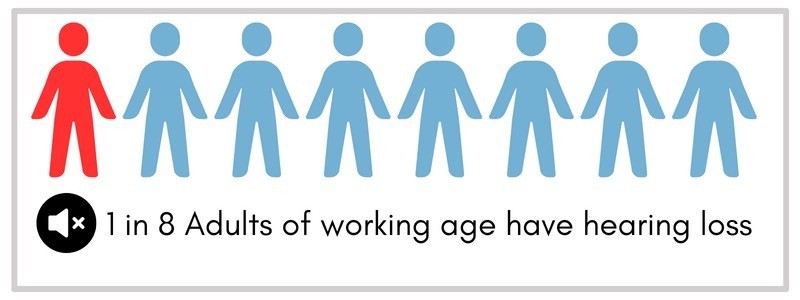
Head of Online Medical Content

Audiology Expert

Hearing Loss at Work
Understanding the impact of hearing loss in the workplace
Overview | Employment gap concerns | The negative impact of hearing loss | Access to Work | How to make your workplace more inclusive | Conclusion
Last Hearing Aid UK Update:
Hearing loss can impact work-life
Sometimes considered an ‘invisible disability’, hearing loss can have great implications and cause unforeseen problems for those affected by the condition, especially in the workplace.
Due to the nature of hearing loss and being considered an ‘invisible’ impairment, it can be overlooked by both colleagues and those in management.
This oversight can lead to feelings of anxiety, loss of confidence and in some cases discrimination in the workplace.
This article explores the challenges workers with hearing loss face and their negative impact, what we can do to support our colleagues, and what accommodations management can implement to ensure an inclusive and safe environment.
Plus, how can this benefit both workers and employees?
How many people have hearing loss in the UK? Prevalence of hearing loss in the UK and the employed population
First and foremost, it's important to acknowledge the widespread nature of hearing loss among employees in the UK.
According to RNID (formerly known as Action on Hearing Loss), a leading charity and advocacy organisation for people with the condition, 1 in 8 adults of working age has hearing loss.
That translates to 5 million people of working age in the UK, potentially working whilst dealing with some degree of hearing loss. The number of people with hearing loss is also expected to rise to a staggering 14.2 million people by 2035.
It is important to recognise this is not an isolated issue facing a niche group of people, but a common and pervasive condition a large portion of the population faces.

Employment Gap and Difficulties at Work
The financial impact of hearing loss
Employment gap concerns in the UK
However, despite the prevalence of hearing loss in the workforce, there is a concerning employment gap.
Deaf people and those with hearing loss are statistically less likely to be employed when compared to the general population.
This disparity highlights the need for greater awareness, accessibility, and inclusive practices to ensure that those with hearing impairments have equal opportunities, without facing discrimination, for meaningful and gainful employment.
Hearing loss can limit earning potential and career advancement and have a notable financial impact, statistically resulting in lower-income households. Deaf people and those with hearing loss are also overrepresented in lower-status, lower-paid occupations. These factors can lead to financial stress for those affected.
The challenges associated with hearing loss may prompt some to consider early retirement, affecting their overall financial stability.
Addressing these financial consequences is vital for promoting equal opportunities and providing support to those with hearing loss in their professional lives.
The negative impact of hearing loss discrimination in the workplace and its consequences
What problems can hearing loss cause in the workplace? The negative impact on those with hearing loss from this disparity stemming from deaf discrimination in the workplace can be vast.
From economic and social consequences such as reduced financial independence, and lower quality of life, to a sense of exclusion, anxiety and depression.
According to RNID, most people who are deaf or have hearing loss have felt stressed at work due to the condition. Although it is important to disclose a hearing impairment, people worry they will be treated unfairly, which leads to a loss of support and resources.
Employees experiencing hearing loss may grapple with feelings of isolation, frustration, and diminished self-esteem.
These emotional challenges can have cascading effects on mental health, job satisfaction, and overall quality of life, which can ultimately influence workplace performance and morale.
Good communication skills are regularly emphasised as a major requirement of employment, adding to the pressures in the workplace, as hearing loss can create significant difficulties in this aspect of professional life.
Minor, everyday occurrences that workers without hearing loss take for granted can become significant obstacles.
For example, participating in meetings, receiving verbal instructions, and engaging with clients and colleagues can all be impacted by hearing loss, resulting in misunderstandings, decreased productivity, and heightened workplace stress.

Is Hearing Loss a Disability in the UK?
Is hearing loss covered by the Equality Act 2010?
Hearing loss at work and the law
If you are deaf or experiencing hearing loss, according to the Equality Act 2010, you may fall under the definition of disability. The Equality Act protects people in the workplace against unfair treatment.
This designation entitles you to equal access and equitable opportunities, ensuring that you are not subjected to discrimination.
If you are deaf or have hearing loss or tinnitus that fits this definition, you will have rights under the Act, even if you don’t think of yourself as being disabled.
Access to Work - Information for employers and employees
There are resources available to assist in overcoming the challenge of hearing loss. The Access to Work scheme is a UK government-funded program that provides support and financial assistance to those with disabilities or health conditions to help them overcome barriers they may face in the workplace.
The scheme is designed to promote equality and inclusion in employment by offering a range of support services and accommodations.
This can include practical support, mental health at work and financial help to help with communication in job interviews, depending on the applicant's needs.
Employees and employers who could benefit from Access to Work do not necessarily know about the scheme, which offers aid in meeting workplace needs. A 2018 survey suggested only a quarter of people who have heard about Access to Work are accessing the scheme.
Key features of the Access to Work scheme you may find helpful:
- Financial support: Access to Work can provide financial support to cover the costs associated with disability-related workplace accommodations and support services, helping those with hearing loss access the necessary tools and services to perform their jobs effectively.
- Assessment and advice: The scheme offers personalised assessments and advice to determine the specific needs of each individual.
- Support workers: Access to Work can provide funding for support workers, including sign language interpreters, personal care assistants, note-takers, and job coaches, depending on the individual's requirements.
- Specialised equipment: Funding may be provided for specialised equipment such as screen readers, communication devices and assistive technology to enhance accessibility and job performance.
- Adaptive software: Access to Work may fund adaptive software and technology solutions that enable people with disabilities to use computers and digital tools effectively.
- Mental health support: The programme recognises that mental health conditions can also impact work performance and offers support for individuals dealing with these conditions.
Employers and employees can work together
Employers and employees can work together with Access to Work to ensure that reasonable adjustments are made to accommodate the needs of people with hearing loss, making the workplace more inclusive and accessible.
The scheme plays a huge role in helping people with disabilities overcome barriers to employment and maintain their jobs successfully.
To access the scheme, individuals typically need to meet certain eligibility criteria related to their disability or health condition, be in paid employment or about to start a job and live in England, Scotland, or Wales.
The level of support and funding provided may vary depending on individual circumstances.
Employers should note that you shouldn’t ask employees about their hearing loss during a job interview. Once a successful candidate has been chosen, any disability or health condition that could impact their work can be discussed.
Ideally, this discussion is encouraged as 54% of workers with hearing loss have avoided telling their employers, which could lead to missing out on vital aid and support available.
And remember, embracing disability inclusion is beneficial for all. Companies that actively promote disability inclusion have documented a remarkable 30% increase in profit margins compared to their counterparts.

Tips For Colleagues
How to make your workplace more inclusive
How to support a colleague with hearing loss at work:
There is plenty of support and resources for working with hearing-impaired employees. Here is a list of tips to help support your colleague with hearing loss:
- Make sure you have their attention before speaking.
- If you need a longer chat, find a quiet place with good lighting and no distractions.
- Make sure when speaking that you don’t accidentally cover your mouth.
- Utilise visual aids such as presentations, slides, and written agendas during meetings to supplement verbal communication. These aids can provide valuable context and make it easier to follow the conversation.
- Ask! – Even if they have a hearing aid, is there anything else you can do to help them? For example, do they need to lipread? Then you can make small adjustment, such as making sure you are fully facing them
For workers with hearing loss: Coping with hearing loss at work
Effectively managing hearing loss in the workplace can seem daunting, but there are plenty of small ways you can improve your situation. Here are some easy tips you can implement today:
- When working in a busy environment, consider sitting with your back to the wall to reduce background noise and distractions, and ensure you are well situated to pick up visual cues.
- Stay Informed. Keep up with the latest advancements and accessories in hearing technology and assistive devices, as new tools are continually being developed to enhance the work experience for those with hearing loss.
- Raise awareness and educate your colleagues about hearing loss, its impact, and how they can support you in the workplace. This will better promote an environment of understanding and empathy.
- Take plenty of breaks! Listening to hearing loss can be exhausting. If possible, schedule short breaks during the workday to rest and recharge your hearing abilities.
Remember that effective communication and coping strategies may vary depending on the type and degree of hearing loss and individual preferences. It's important to adapt these tips to your unique situation and work environment.
Conclusion
Hearing loss in the workplace is an important issue for a large portion of the population, with far-reaching implications.
The challenges faced by people with hearing loss, often overlooked due to their 'invisible' nature, can result in feelings of anxiety, loss of confidence, and even discrimination in professional settings.
However, recognising, supporting, and accommodating colleagues with hearing loss can lead to a more inclusive and safe work environment. It is important to embrace awareness and take proactive measures, ensuring that no one is left behind.
By doing so, we can create an environment where individuals with hearing loss can reach their full potential, furthering their careers and contributing to overall workplace success.
Why Choose Us?
- FREE Hearing Tests
- Best Hearing Aids and Prices
- FREE Aftercare for Life
- FREE Home Visits
- 200+ Local Audiologists
- 60 Day Money Back Guarantee
Is your hearing loss affecting your work?
If you are struggling to understand colleagues during meetings or conversations or misinterpreting instructions or information due to unclear communication can be indicative of hearing impairment. Therefore, it is beneficial to seek professional help as soon as you can.
If you've been affected by any of the issues discussed in this article or have noticed a change in your hearing, call us free on 0808 253 5120 to speak with one of our team.
►Read our article on how else hearing loss can affect our day to day lives
Other hearing loss awareness articles you might like...
 Hearing aid stigma
Hearing aid stigma  The impact of diet on your hearing
The impact of diet on your hearing  How to tell if hearing loss is permanent or temporary
How to tell if hearing loss is permanent or temporary What's included in our hearing aid prices?
Our specialist service includes:
Do not spend hundreds of pounds without getting a second opinion from us.
Please call us on 0800 567 7621
 Not only are the prices great, but the service is fantastic! Many thanks to your team.
Not only are the prices great, but the service is fantastic! Many thanks to your team.Other pages you might find useful
Ask the Experts
6 Morton Lane
Walkwood
Redditch
Worcestershire
B97 5QA
Latest Launch
When we refer to a product as 'Latest Launch', we mean it is the latest to be released on the market.
New
When we refer to a product as 'New', we mean that the product is the newest hearing aid model on the market.
When we refer to a product as 'Superseded', we mean that there is a newer range available which replaces and improves on this product.
Older Model
When we refer to a product as an 'Older Model', we mean that it is has been superseded by at least two more recent hearing aid ranges.
